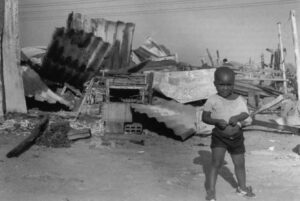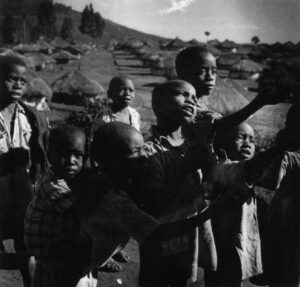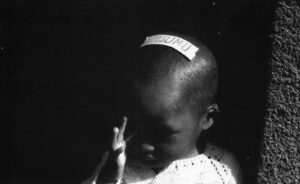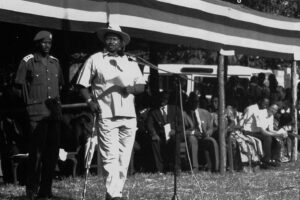Bill Berkeley
- 1994

Fellowship Title:
- Ethnic Conflict in Africa
Fellowship Year:
- 1994

Truth on Trial:South Africa’s Past Shades its Future
By the evolving standards of the new South Africa, Themba Khoza might seem to be what he says he is: “the main man,” filled with promise, living out a dream that would have been unthinkable only a few years ago. Born in Zululand and raised in Soweto, where he was known, he says, as a “staunch Christian and completely honest,” Khoza was elected in 1994, at the age of 35, to South Africa’s first non-racial Parliament. Dapper in a white Oxford shirt and paisley tie, Khoza is smoothly affable, articulate, with soft eyes and a neatly trimmed beard. In his bustling office in downtown Johannesburg, he takes calls on a cellular phone, dictates instructions to a bevy of admiring secretaries, and parries questions from a reporter with the glib assurance of a practiced politician. “When you are a leader by birth,” he says, “you are able to handle a situation.” A woman weeps among the ruins of her home on Tokoza, South Africa in September, 1990 as savage faction fighting coninued in townships around Johannesburg.

Kenya: Barely Escaping Rwanda
By Bill Berkeley and Photos by AP/Wide World Photos By the benighted standards of East Africa, the spectacle of refugees is all too grimly familiar. In a dense labyrinth of makeshift huts with scrap-metal walls and roofs fashioned from black plastic sheeting, children in rags, with bare feet and smudged faces, loiter aimlessly in a stream of muddy sewage. Their grim-faced parents, routed from their homes and stripped of their livelihoods, desperately scrounge for food and firewood in the forest nearby, their lives in chaos, their future uncertain. This could be anywhere in the counter-clockwise arc of despair that has blighted this part of the world for a generation: Somalia, Ethiopia, Sudan, Uganda, Rwanda and Burundi. A few miles from Nyeri, the heart of Mau Mau land, these Kikuyu children beg money from a passerby. Behind them are seen the round mud huts clustered together in protection against Mau Mau raids. But this is none of those exhausted battlegrounds — this is Kenya. Kenya has long been an exception to the regional rule of interminable

Terror Surrounds Rwanda’s Orphans
By Bill Berkeley and Photos by Mary Jane Camejo Sitting cross-legged on a wooden bench in an abandoned school tucked amid the steep mountain slopes of central Rwanda, 13-year-old Reveriani Rurangwa delicately runs a finger along the smooth, shiny scar that wraps around the side of his face from nose to ear. His ruined left eye is concealed behind a day-old bandage. What remains of his left arm is wrapped in gauze. In a voice that barely rises above a whisper, Reveriani recalls the spring day in 1994 when Red Cross workers pulled him from a pile of corpses that included his mother, his father, his brothers and sisters, and several hundred friends and neighbors. Umulisa is an orphan in the displaced camp in Rutare in northern Rwanda. Too young to know her own name and unaccompanied by relatives, she has been named by people in the camp. “Perhaps they believed me to be dead,” he says of his attackers. “We were all inside the Catholic Church. There were so many there. We were attacked

Paying for Past Crimes: Uganda’s Murderous Lessons for Rwanda
On a Sunday morning in June in the ravaged Rwandan town of Kabuga, on the outskirts of Kigali, the capital, tens of thousands of hungry and bewildered men, women and children wandered aimlessly amid the wreckage of their lives. In the previous two months as many as half a million Rwandans, mostly minority Tutsis, had been systematically slaughtered after Rwanda’s president, Juvenal Habyarimana, was killed in a suspicious plane crash. Both the United Nations and the U.S. State Department have used the word “genocide” to describe the carnage. Ugandan President Yoweri Museveni gives a speech in Wobulenzi in the Luwero Triangle. The President has put reconcilliation above retribution for the country’s past massacres. Perhaps a million Ugandans were killed in the last two decades. (Photo by Mary Jane Camejo) Among the survivors now living amid the looted ruins of Kabuga was Bonaventure Niyibizi, a Tutsi economist who lost his mother, sister, five nieces and nephews, four uncles and their families –more than 50 relatives in all. I asked him how Rwanda might overcome this tragedy.
